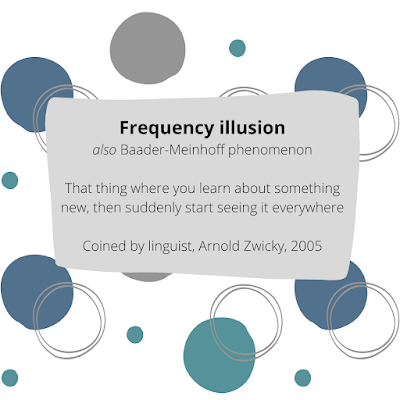Different perspectives & the frequency illusion
Recently, for various reasons, I’ve been looking at some relatively low-frequency words. Yesterday, I had paranormally to deal with and it sparked a couple of thoughts about the way I work with language.
Most of the time when you’re researching and compiling dictionary entries, your feelings about the words you’re dealing with are fairly neutral. Sometimes, you get a fun word just because it expresses a fun idea, because it’s pleasingly onomatopoeic, or because it’s rude. Sometimes, words are awkward because they sprawl across tricky-to-split senses or have lots of confusing variants. And sometimes words are just hard to get your head around – see my recent post about hard words. Then there are words that you realize you’re biased against because they express ideas you feel uncomfortable about or, in this case, sceptical of.
Initially, I wasn’t sure that ‘paranormally’ even felt like a feasible word. Of course, ‘paranormal’ as an adjective and a noun are pretty frequent, but I couldn’t imagine how it’d be used as an adverb. So, I looked at the corpus evidence and, although it wasn’t super-frequent, there was enough evidence to investigate further. I scanned through the cites and found myself immediately drawn to the jokey, ironic, and yes, sceptical uses. When you’re compiling dictionary entries and looking for good example sentences, it’s tempting to plump for the ones you can hear yourself saying, because they feel more natural. But then you have to check yourself and remember that other people who will be looking these words up, may be coming from very different perspectives.
When I come across words that for whatever reason don’t fit with my own beliefs and opinions, I try to think of someone I know who would have a different perspective. As a firm atheist, I always feel a bit squeamish about words with religious connections or connotations, but I have some more religious friends whose shoes I try to imagine myself into. In this case, I immediately thought of an old childhood friend who I know has an interest in the paranormal, as well as a whole host of other ideas I wouldn’t normally pay much attention to. So, I approached the evidence again through her eyes and gave her a couple of examples to pick to balance my more sceptical choices.
Later in the day, I was scrolling through my Facebook feed and came across this post from her:
Labels: bias, frequency illusion, lexicography




1 Comments:
Very interesting and complex. Impressive work, Julie! Talking of the 'frequency illusion', I've noticed that my students' collected vocabulary (words that they find interesting, new or difficult to pronounce) often pop up subsequently. Slightly eerie...
Post a Comment
<< Home